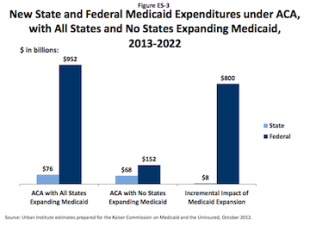 Cost of expansion (Kaiser)As governors ponder whether to expand their Medicaid programs to cover millions more low-income people under the federal health care law, a new study claims that states that hold out won't necessarily save that much money.
Cost of expansion (Kaiser)As governors ponder whether to expand their Medicaid programs to cover millions more low-income people under the federal health care law, a new study claims that states that hold out won't necessarily save that much money.
President Barack Obama's health care law asks states to expand their Medicaid programs?often the biggest line item in state budgets?to cover all residents whose incomes place them at or near the poverty line. (Most states' Medicaid programs currently cover only low-income children and their mothers.) In June, the Supreme Court ruled that the federal government couldn't financially punish states that opt out of the expansion, giving governors the opportunity to say no.
After the ruling, the governors of eight states, most of them in the South, have announced they will not participate, while governors in five more states have said they are leaning toward not joining.
But a new study by the Kaiser Family Foundation finds that on average, states won't save that much money by opting out. That's because the federal government is picking up most of the tab for the expansion, and also because states' Medicaid rolls will expand significantly even if they don't sign on since the law encourages more eligible adults and children to enroll.
If all 50 states states agree to the expansion, about 21 million new low-income, uninsured people are expected to enroll in the program at a total cost of $76 billion, the study says. If no states participate, an additional 5.7 million people will still join states' Medicaid rolls at a cost of $68 billion, because the law will encourage all eligible people to sign up. If all states participate, collectively they'll spend just $8 billion more than if they all opted out. (The study also estimates that $18 billion would be saved in uncompensated care under the expansion, but much of that savings would go to local governments, not states.)
The total cost of the Medicaid expansion will be $1 trillion over 10 years, with the federal government picking up 93 percent of that tab. After 2020, states will have to pay for 10 percent of the new Medicaid costs.
The costs varies widely state to state, which may explain?some governors' wariness of the program. A handful of states (Connecticut, Delaware, Iowa, Massachusetts, Maryland, Maine, New York and Vermont)?that have already expanded their Medicaid programs will actually save money under the new plan, because the federal government will offer higher matching funding. But the rest of the states will see their Medicaid costs go up by as much as 11 percent. On average, states' Medicaid spending will go up by 3 percent over 10 years if all states decide to participate.
kourtney kardashian pregnant chip kelly billy cundiff super bowl tickets superbowl birmingham news lee evans
No comments:
Post a Comment
Note: Only a member of this blog may post a comment.